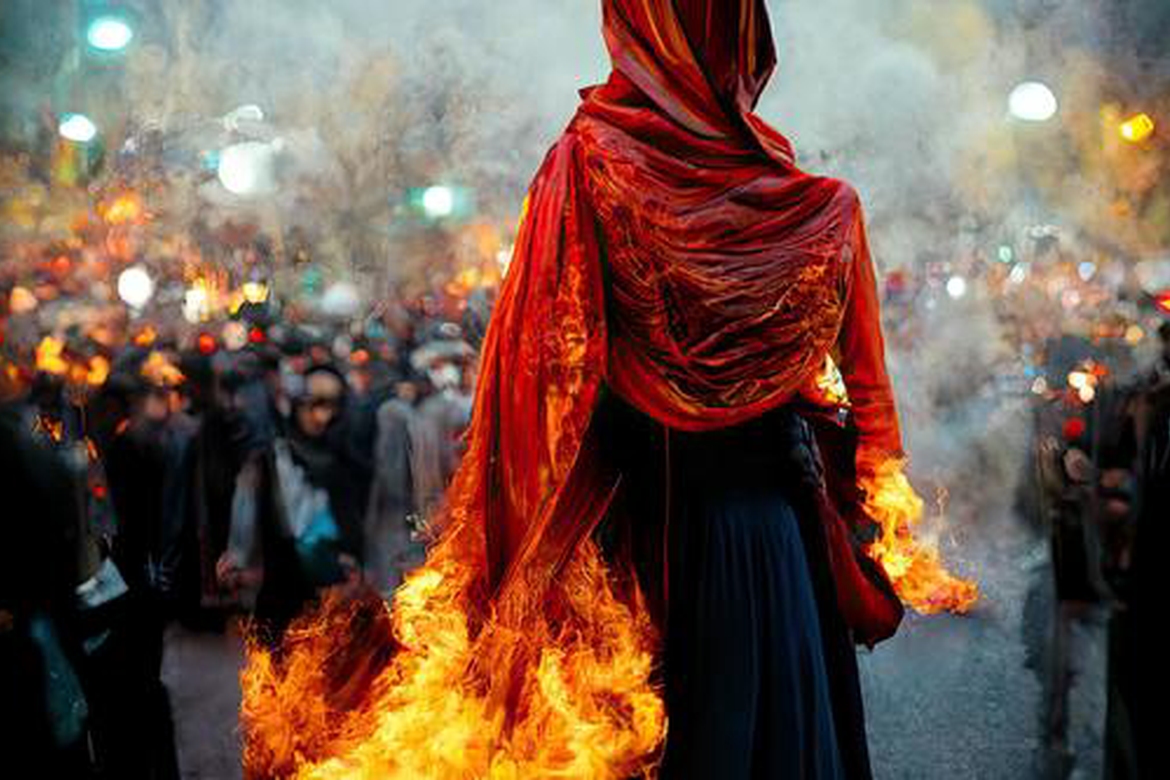Aggressive extremists in Iran
New waves of arrests against Christians and Baha'is by the ayatollahs of Iran.

Persecution is escalating in Iran after murder of Mahsa Amini
The persecution is clearly escalating ahead of the anniversary of the murder of the Kurdish woman Mahsa Amini.
In the first two weeks of July, at least 69 Christians were arrested in 11 cities. At least ten of them - four men and six women - are still in custody. Those who have been released have been forced to sign a pledge that they will never again engage in Christian activities, or they have been ordered to teach Islam. Others have been brought in for new interrogations. Or they have been ordered to leave Iran. Those who have been released have had to pay bail - sums ranging from the equivalent of 7100$ to 36000$.
The Iranian regime recognizes three small religious minorities: Assyrian and Armenian Christians, Jews and followers of Zoroastrianism. But the house churches that recruit large numbers of converts from Islamic backgrounds - there may be up to a million of them - are labeled as a threat to national security, or as agents of "Zionist Christianity".
A few Christians in Iran have recently been acquitted of charges of being national threats. But others have been given harsh sentences by other judges for the same charges. The persecution is harsh and sometimes arbitrary.
90-year-old re-arrested
The largest non-Muslim minority in Iran, the Baha'i community, is also affected by allegations that they threaten national security.
At least 60 members of the Baha'i minority have been arrested, tried and imprisoned in recent months. Among those arrested is a 90-year-old man who has previously served ten years behind bars.
The Baha'i teachings are labeled as heresy by the sija regime.
The regime does indeed cite corruption as the reason why nine Baha'is were arrested on August 13. But until conclusive evidence is presented, there is reason to fear that this is also part of a new targeted attack on a persecuted religious minority.
Nine Baha'i women who were taken to prison in the city of Mashad in early August were convicted of teaching a doctrine that violates Islamic law - Sharia. At the same time, the Revolutionary Court sentenced a Bahai woman to ten years and three months in prison for the same "crime", in addition to charges of threatening national security.
Absurd
It is absurd that the Ayatollah regime sees a 90-year-old Baha'i or a house church as a threat to national security. But the regime is founded on an extreme version of Shia Islam. Anyone who pulls people in other directions is cracked down on as a national threat.
A series of Baha'i leaders were arrested a year ago and accused of being spies for Israel. The accusation was based on the fact that the international Baha'i center is located in the Israeli city of Haifa. The fact that the center has been there since long before the state of Israel was established does not prevent undocumented spy accusations. Three who are still being held in prison have previously served ten-year prison sentences. They were released in 2018.
A group arrested in July this year is also portrayed in the Iranian media as part of a "spy network", "directly or indirectly linked to a Zionist center".
Intensified persecution
The new waves of arrests show that the regime has intensified the fight against freedom of religion and other human rights. The persecution of the Baha'i community and house churches did not stop, even though the security apparatus had its hands full last year with cracking down on demonstrators after the arrest and murder of the Kurdish woman Mahsa Amini. As is well known, she had to pay with her life because she had "worn the hijab incorrectly". Before the anniversary of the tragedy - in September - it is clear that the regime wants to show power.
Foreign Minister Anniken Huitfeldt in Norway must use all the channels she has to speak out clearly about the unrelenting persecution of both the house churches and the Baha'i community. I am glad that the Ministry of Foreign Affairs has long had a clear voice against the persecution of the Ba hais. It is time for Huitfeldt to raise her voice against the systematic persecution of Christians. Stefanus Alliance urges her to do so once again.
"Murdered girl could have been me"
An important occasion is August 22, the UN Day for Victims of Violence based on Religion or Belief. On this day, the Stefanus Alliance, the Helsinki Committee and the Cooperation Council for Religious and Life Stance Communities (STL) are organizing a commemoration in Oslo City Hall. Foreign Minister Huitfeldt will meet Nazila Ghanea, the UN Special Rapporteur on Freedom from Violence against Women.
Ghanea, a professor at the University of Oxford, is herself a Baha'i from Iran. When Ghanea was 11 years old and her family lived in Qatar, an 11-year-old Baha'i girl was killed in Ghanea's Iranian hometown."The murdered girl could have been me," she has previously said.
If Ghanea had stayed in Iran, she would never have been able to get an education or an academic career. The UN Special Rapporteur on human rights in Iran recently stated that he is "extremely concerned" about the situation of Christian converts and Baha'is. Huitfeldt should listen to Ghanea on how Norway can show even stronger solidarity with persecuted religious Christians and Baha'is in Iran.